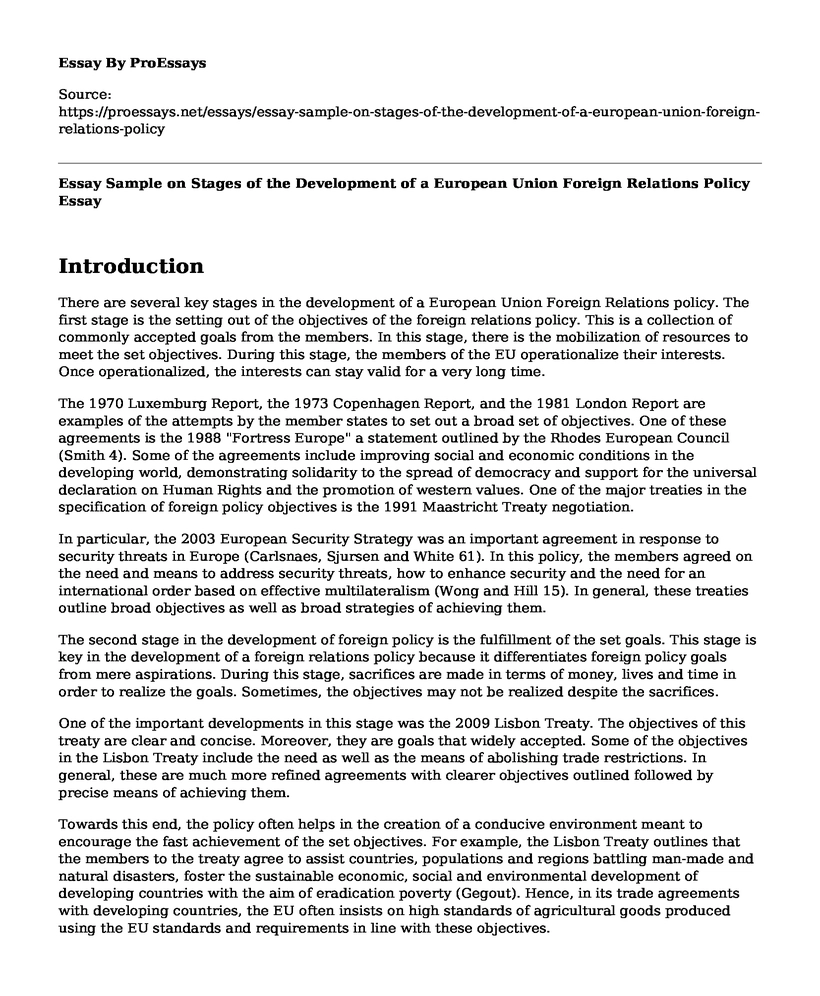Introduction
There are several key stages in the development of a European Union Foreign Relations policy. The first stage is the setting out of the objectives of the foreign relations policy. This is a collection of commonly accepted goals from the members. In this stage, there is the mobilization of resources to meet the set objectives. During this stage, the members of the EU operationalize their interests. Once operationalized, the interests can stay valid for a very long time.
The 1970 Luxemburg Report, the 1973 Copenhagen Report, and the 1981 London Report are examples of the attempts by the member states to set out a broad set of objectives. One of these agreements is the 1988 "Fortress Europe" a statement outlined by the Rhodes European Council (Smith 4). Some of the agreements include improving social and economic conditions in the developing world, demonstrating solidarity to the spread of democracy and support for the universal declaration on Human Rights and the promotion of western values. One of the major treaties in the specification of foreign policy objectives is the 1991 Maastricht Treaty negotiation.
In particular, the 2003 European Security Strategy was an important agreement in response to security threats in Europe (Carlsnaes, Sjursen and White 61). In this policy, the members agreed on the need and means to address security threats, how to enhance security and the need for an international order based on effective multilateralism (Wong and Hill 15). In general, these treaties outline broad objectives as well as broad strategies of achieving them.
The second stage in the development of foreign policy is the fulfillment of the set goals. This stage is key in the development of a foreign relations policy because it differentiates foreign policy goals from mere aspirations. During this stage, sacrifices are made in terms of money, lives and time in order to realize the goals. Sometimes, the objectives may not be realized despite the sacrifices.
One of the important developments in this stage was the 2009 Lisbon Treaty. The objectives of this treaty are clear and concise. Moreover, they are goals that widely accepted. Some of the objectives in the Lisbon Treaty include the need as well as the means of abolishing trade restrictions. In general, these are much more refined agreements with clearer objectives outlined followed by precise means of achieving them.
Towards this end, the policy often helps in the creation of a conducive environment meant to encourage the fast achievement of the set objectives. For example, the Lisbon Treaty outlines that the members to the treaty agree to assist countries, populations and regions battling man-made and natural disasters, foster the sustainable economic, social and environmental development of developing countries with the aim of eradication poverty (Gegout). Hence, in its trade agreements with developing countries, the EU often insists on high standards of agricultural goods produced using the EU standards and requirements in line with these objectives.
The last stage in the development of European Union Foreign relations is the formulation of strategies of overcoming common obstacles. The union is large and complex and faces a plethora of obstacles to achieve various goals. One of the challenges is that members states can still act autonomously in regards to international affairs. In addition, its institutions can clash, especially the European Commission. To overcome these obstacles, the union has invested in the creation of intergovernmental institutions.
Works Cited
Carlsnaes, Walter, Helene Sjursen and Brian White. Contemporary European Foreign Policy. London: SAGE, 2004. Print.
Gegout, Catherine. Why Europe Intervenes in Africa: Security, Prestige and the Legacy of Colonialism. Oxford: Oxford University Press, 2017. Print.
Smith, Karen E. European Union Foreign Policy in a Changing World. New Jersey: Wiley, 2008. Print.
Wong, Reuben, and Christopher Hill. National and European Foreign Policy: Towards Europeanization. Berlin: Routledge, 2012. Print.
Cite this page
Essay Sample on Stages of the Development of a European Union Foreign Relations Policy. (2022, Nov 26). Retrieved from https://proessays.net/essays/essay-sample-on-stages-of-the-development-of-a-european-union-foreign-relations-policy
If you are the original author of this essay and no longer wish to have it published on the ProEssays website, please click below to request its removal:
- Sources of the Constitution - Paper Example
- Essay on Growth of Saudi Arabia
- Assignment Example on Cityscape Global Conference: Facets of Happiness
- Essay Sample on George Orwell's Position on Imperialism
- Essay Sample on 2016 US Election: Clinton Wins Popular Vote but Trump Wins Presidency
- OPEC: Venezuela and the Founding Nations - Research Paper
- Research Paper on NAFTA: Unlocking Trade Among US, Canada and Mexico







